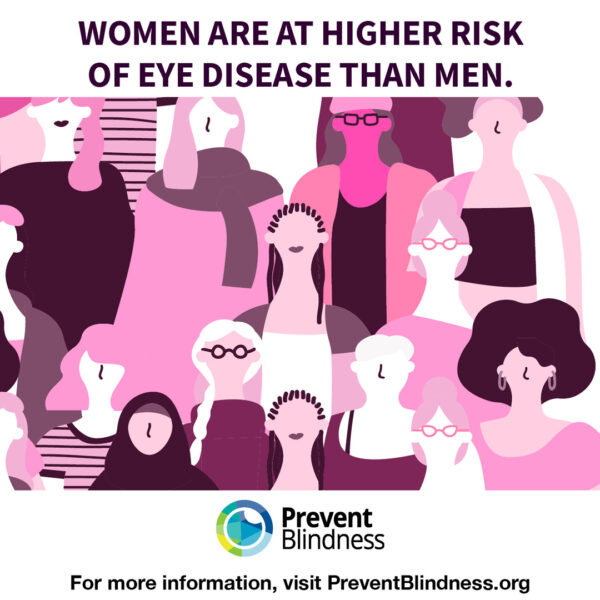ISPB and Prevent Blindness Illinois (PBIL) have declared April as Women’s Eye Health and Safety Month. We offer free resources, including fact sheets, shareable social media graphics, educational videos and web pages, on a range of eye health issues that predominantly affect women.
Eye diseases such as age-related macular degeneration, cataract, dry eye, glaucoma, and thyroid eye disease, occur more frequently in women than men. According to the American Academy of Ophthalmology (AAO), on average women live longer and many eye problems are age-related. Social and economic factors affect women’s access to eye care, especially in developing countries.
Women also have a higher incidence of refractive error. And, women may also experience vision changes during pregnancy and/or menopause.
ISPB/PBIL advises that women can help protect their vision and eye health by:
- following a healthy diet,
- exercising regularly,
- not smoking,
- learning about any family history of eye diseases as some may increase their risk of disease, and discussing it with their eye care provider,
- seeking treatment early for any conditions that can lead to vision impairment and receive follow-up care.
As part of the number of free educational resources that Prevent Blindness offers on women’s vision issues, a new Focus on Eye Health Expert Series episode is available, “Healthy Vision and Eye Safety Tips for Women.” Prevent Blindness Vice President of Public Health and Policy Kira Baldonado interviews Maria Sampalis, OD, owner of Sampalis Eye Care, discussing the importance of women accessing regular eyecare as well as obstacles some encounter, different vision conditions that affect women, and other health conditions that may be detected through an eye exam. Dr. Sampalis was the recipient of the 2024 Theia Award of Excellence for Industry Influence from Women in Optometry, and is a volunteer member of the Prevent Blindness Development Committee.
This discussion will also be featured in the new Prevent Blindness Focus on Eye Health Podcast later in April.
“As eye care professionals, it’s crucial to recognize the unique eye care needs based on gender,” said Dr. Sampalis. “Patients often present with wide range of concern, and we must be at forefront of addressing these needs to ensure the best possible care.”
Additionally, the Focus on Eye Health Expert Series episode Women’s Eye Health and Safety features Janine Austin Clayton, MD, FARVO, Director, Office of Research on Women’s Health at the National Institutes of Health (NIH). Dr. Clayton also wrote the “Women and Eye Health” essay for Prevent Blindness.
EyeCare America from the AAO offers individuals ages 65 and over an eye exam at no out-of-pocket cost, to those who qualify. (On April 7, the minimum age for this program will be lowered to 18). More information may be found at: aao.org/eyecare-america/patients. We also offer a free listing of financial assistance services in English and Spanish at: preventblindness.org/vision-care-financial-assistance-information.
For more information on women’s eye health topics, please visit PreventBlindness.org.




